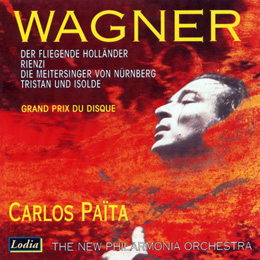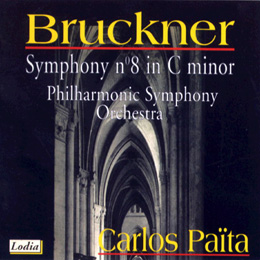 |
| June 1, 2008 Carlos Paita, Back in Circulation
Something else that Amazon has currently, in very limited quantities, is a double handful of recordings of far more familiar material under a far less familiar conductor, Carlos Paita. Now there’s a name that will not only ring bells but send off electrical charges for some serious collectors. Like Jorge Mester, who was born in Mexico in 1935 (to Hungarian parents), Paita also hails from Latin America: he was born in Argentina in 1932. But unlike Mester, who was trained in the US and has been a productive and respected presence here throughout his professional life (and has made far too few recordings for a musician of his caliber), Paita has made only three very brief and little noted visits to our shores; his reputation here, as in most of the world, is based almost entirely on his recordings, which have made strong impressions in spite of the huge competition they faced among the glut of recordings of well loved works of Tchaikovsky, Brahms, Wagner, Berlioz, Bruckner and Dvorák. These started off impressively, almost exactly 40 years ago, when Decca (London Records in the US at that time) issued his first recording, in its Phase4 series: a Wagner program -- the Overtures to Die Meistersinger and The Flying Dutchman, and the Prelude and Liebestod from Tristan und Isolde -- with the New Philharmonia Orchestra. The Phase4 LPs in those days came in "gatefold" sleeves, and the liners in this one were framed by a dozen or more photos of Paita, taken during the recording sessions. Those pictures tended to support the image created in the few reports of his rehearsals and concert appearances in London: "fiery temperament . . . intense . . . impassioned . . . driven . . . ." There was for sure nothing "businesslike" about Paita, who was then in his middle 30s. There was real wildness in those pictures, and real intensity and passion in those Wagner performances. The excitement they generated was a truly Wagnerian excitement, its eruptive nature balanced by a subtle control, deep and detailed understanding, utter conviction -- and a mystic power for getting a "burnished gold" sound from his orchestra.
From the biographical bits in the annotation with that Wagner LP and subsequent ones, we learned that Paita studied music with some prominent teachers in Buenos Aires, but did not go the conservatory route. In attending concerts in his home town and on visits to Europe he found his calling as a conductor. He was particularly inspired by Wilhelm Furtwängler, and he had some lessons from another legendary conductor, Artur Rodzinski. In the course of his military service he got his first podium experience conducting the Buenos Police Force Band, and in 1956, at age 24, he presided over a concert of the orchestra of the Teatro Colón. As both the traditions of that famous house and the political climate in Argentina at mid-century tended to weigh against the rise of a native conductor, Paita moved to Europe, where he became one of the numerous young musicians encouraged by Furtwängler’s widow, Elisabeth, and by 1965 he was attracting favorable attention with his concerts in various major centers. If Paita’s fiery temperament seemed a throwback to an earlier age, it was simply one factor in his determined connection with a kind of music-making he embraced unreservedly. His strong personality was always never allowed to get in the way of his clear understanding of what the music at hand was all about, but was focused on getting his players to share his conviction, to give themselves up to the music as he gave himself up to it, and simply deliver the goods. With the Netherlands Radio Philharmonic he served up a heady brew of colorful overtures: Berlioz’s Roman Carnival, Beethoven’s Leonore No.3, Brahms’s Academic Festival, Wagner’s Rienzi. With the Scottish National Orchestra, there was an impactive Eroica; with the Royal Philharmonic, a striking Mahler First, a stylish demi-dozen Rossini overtures and a Verdi Requiem. The last of his Decca releases, a brilliant Symphonie fantastique with the London SO, brought him another Grand Prix du Disque in 1978, but Decca apparently issued it only in France; it did not appear anywhere else until Paita’s backers bought up the original masters of his Decca recordings and proceeded to reissue them on the Lodia label which they created for him. At just about that time -- early in 1979 -- Paita made his American début, conducting the Houston SO in a set of concerts made up of the Overture to The Magic Flute, Brahms’s Haydn Variations, and Mahler’s First Symphony. By that time, too, digital recording had entered the picture, and all the recordings Lodia began making in 1980 were digital. Actually, the first two of these may have been made by Decca and simply remained unissued until Lodia came into the picture; in any event, their first and only release was on Lodia. Both of them -- a Brahms First that ranks with the very best, taped in 1981, and a similarly persuasive Tchaikovsky Pathétique recorded the previous year -- were made with the National Philharmonic, a recording orchestra organized by Sidney Sax from London’s broad pool of first-rate musicians; the NPO had made several recordings for Decca and had also made the last of Leopold Stokowski’s recordings for CBS. While Paita adored Furtwängler, he respected him (and himself) too much to imitate him. His reading of the Pathétique is broad and deepfelt but never eccentric. The outer movements are exceptionally persuasive in respect to both their emotional impact and their sheer power, because both impressions seem to arise directly from the music, with a sense of both elements’ being kept, through instinctive taste and masterly control, from spilling over into unrestrained bathos. The two inner movements are crisp and clear, the march a lesson in how to build a convincing climax (or two, or three . . .). Antony Hodgson, who produced these recordings (and had also done the Fantastique for Decca, with the admired Arthur Lilley as his engineer), feels that the Pathétique (again with Arthur Lilley at the controls) was the best of the several things he and Paita did together. "There is only one edited section in the whole performance," Hodgson advises," and although it was multitrack what you hear is more or less the straight monitored sound. The March is as thrilling as any I have heard." When it comes to Brahms, Paita expresses impatience with the tradition of shifting gears into a distended statement of the chorale toward the end of the First Symphony, and his own performance of course avoids that gratuitous overlay of grandiosity on an episode whose real grandeur lies in the straightforward way the composer set it down. "Paita would sometimes lose his temper," Antony Hodgson recalls, "but he had a sense of humour and during one of our sessions I calmed him down by pointing out, to his considerable amusement, that our two countries, at that time, were at war with each other. His passion for attaining his musical goals sometimes created high tension at recording sessions, but this never disturbed me because I knew that a spark of genius always lay within. He knew his music and the sound that he got from a big orchestra was gorgeous, of the same richness and indeed as impressive as that obtained by Stokowski. For all its weight and fullness, every instrument was audible within the rich context." While Paita also recorded with the LPO and the RPO for Lodia, a new orchestra was formed for him: the Philharmonic Symphony Orchestra. That name had been used earlier by Westminster as a disguise for the RPO, but this time it was applied to a separate and distinct ensemble, following the example of the National Philharmonic, and Paita not only recorded with his PSO but also gave concerts, both in London and on tour in Continental Europe. The high point of its discography, and his, is an absolutely stunning Bruckner Eighth. Paita chose the Haas edition and eschewed all notions of tradition and custom, of ceremony and monumentalism, simply rethinking the score on what he perceived to be its own terms. What emerges is a compelling, exalting listening experience, full of uncontrived movement and drama and color and conviction. In the same league is a vibrant account of Dvorák’s glorious Seventh Symphony, which several critics singled out as the all-round finest account of that work yet recorded. The essential sanity of this realization, as well as its overall warmth of heart and instinctive, unfeigned elegance, is a powerful reminder that whatever "eccentricity" might be charged to Carlos Paita it definitely does not intrude itself into his music-making. Also with the Philharmonic Symphony Orchestra, there is a persuasive bunch of scenes from Wagner’s Götterdämmerung, with the tenor James King and the soprano Ute Vinzing, in which Siegfried’s Funeral March achieves an exalted state of tragic eloquence. Both that orchestra and the National Philharmonic are involved in a Russian package comprising the Mussorgsky/Ravel Pictures at an Exhibition and short pieces by Borodin and Glinka. Eventually Paita recorded Tchaikovsky’s Fourth Symphony and some of that composer’s other works in Russia, with the "Moscow New Russian Orchestra." During these early years of recording for Lodia, Paita returned to the US just twice, to conduct the National SO in Washington, at the invitation of Mstislav Rostropovich, in concerts that remain his only ones in this country since those in Houston. In October 1981 he gave four luminous performances of Mahler’s Ninth Symphony, and in March 1987, exceptionally characterful ones of Brahms’s Academic Festival Overture, the Prelude and Liebestod from Tristan, and the Bruckner Fourth. That Bruckner got Paita an invitation from Leonard Slatkin to conduct the St Louis SO, but there were discussions of the instrumentation and the orchestral seating, and he never got to St Louis. He did continue giving concerts all over Europe, though, and recording for Lodia.
Amid the enthusiasm these recordings have understandably generated, it must be conceded that the 1987 Schubert C-major Symphony with the RPO has generated controversy as well: here Paita was clearly taking risks in a highly personal approach, putting off some listeners while leaving others with a sense of utter exaltation. Somewhat less controversially, his earlier, Decca-recorded Verdi Requiem simply misfires, despite some inspired moments and fine soloists. But the rest of Paita’s discography is well worth investigating -- this, after all, explains the hefty $30-$40 asking prices for the items offered on Amazon -- and it is all available again, on CDs which in some cases have corrected mastering misjudgments on the respective LPs. Lodia has had no North American or UK distribution for 20 years or so, but all the Paita recordings may be ordered now from the Swiss distributor Smart Music. Moreover, Lodia Music International has created a "Paita Edition" for circulating several live concert recordings made with various European orchestras during the last few decades. Among these will be a complete Berlioz Roméo et Juliette from the Prague Festival, a Tchaikovsky Fifth with the New Russian Orchestra, a Bruckner Fourth with the Philharmonic Symphony Orchestra, and, with the Brussels Radio Orchestra, such works as the Bruckner Ninth, the Mahler Sixth, the Chausson Symphony in B-flat, Schoenberg’s Transfigured Night, and the Strauss tone poems Don Juan, Ein Heldenleben and Death and Transfiguration. Details on available titles and ordering procedure may be found on the website www.carlospaita.com, or at www.smart-music.ch. ...Richard Freed
Ultra Audio is part of the SoundStage! Network. |
 In the last
In the last  Irving Kolodin, one of the
most respected music critics in America, and one not lightly swayed, described
Paita’s performance of the Tristan material as "the best to be heard in
years, on a plane of musical perfection and emotional eloquence rarely heard since the
passing of Furtwängler, Knappertsbusch, Beecham and other great names of this literature
(not excluding Toscanini)." The recording won a Grand Prix du Disque -- not
bad for a first time out,
Irving Kolodin, one of the
most respected music critics in America, and one not lightly swayed, described
Paita’s performance of the Tristan material as "the best to be heard in
years, on a plane of musical perfection and emotional eloquence rarely heard since the
passing of Furtwängler, Knappertsbusch, Beecham and other great names of this literature
(not excluding Toscanini)." The recording won a Grand Prix du Disque -- not
bad for a first time out,  All of Paita’s LP
recordings were transferred to CD by Lodia (the Bruckner Eighth, originally on two CDs
with the Tristan material as filler, was remastered onto a single disc), and from
the mid-1980s, of course, all were issued originally in the newer format.
All of Paita’s LP
recordings were transferred to CD by Lodia (the Bruckner Eighth, originally on two CDs
with the Tristan material as filler, was remastered onto a single disc), and from
the mid-1980s, of course, all were issued originally in the newer format.